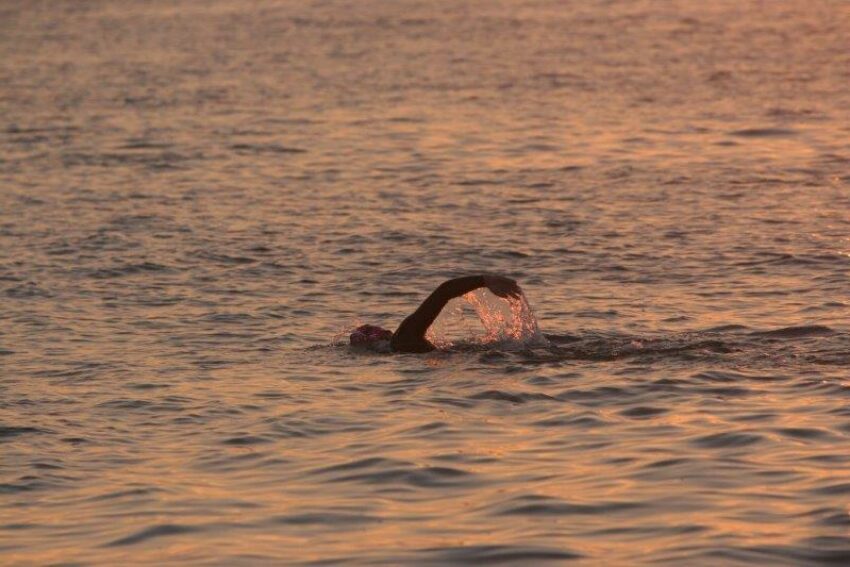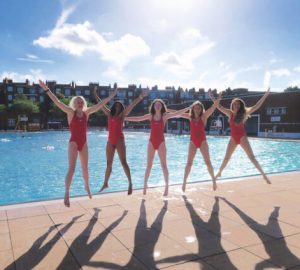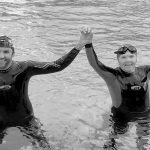Interview: Scott Dawson – swimming around the Isle of Wight
A few years ago, Scott Dawson weighed 19 stone (~120kg), and decided he needed to do something about it so took up running and swimming again with Swim Fit sessions, and in two years got down to 14 stone (88kg). The Swim Fit led to open water swimming, which led to swimming across the Solent and culminated in doing a (wetsuit assisted) swim around the Isle of Wight on 31 August (65 miles) in a time of 25 hours and 56 minutes.
Most people don’t circumnavigate the Isle of Wight as their first long distance swim. What made you choose this challenge?
I guess, firstly, it’s local but it’s not quite my first long distance swim. I previously swam from Stokes Bay to Ryde with the Oakley Waterman Foundation. When I started again in 2014 it was about 20 years since I’d done any real swimming. The people at the Oakley Waterman Foundation put the fear of God into me before the cross Solent swim so I trained really hard. Probably because of that, the swim turned out to be much easier than expected, so I thought: why not try to swim all the way around the Island?
What was behind your decision to do it in a wetsuit?
Obviously I’m aware that swimming purists don’t see it as a real swim if you do it in a wetsuit but I’m not a career swimmer – sailing is my main hobby – so that doesn’t really bother me. I haven’t been really connected with the swimming world until now, and I knew this was still a massive challenge, for any swimmer, even with the wetsuit, so that was good enough for me. I did train both with and without the wetsuit and contemplated removing the wetsuit if it was troubling me but I was comfortable throughout and barely suffered any chafing.

All images (c) Ian Holtedahl-Finlay
How much training did you do?
At my peak, around 18 hours per week as a mixture of pool and open water swimming, as well as some running. From an endurance perspective, I reckon three hours of running is about as hard on the body as seven hours of swimming, so it’s quite efficient.
Part of the training was about preparing me mentally. I was lucky (sort of) to be mentored by endurance athlete Euan McGrath, who intentionally tried to break me in training, so that I knew what it felt like to hit the wall and therefore how I would cope with it. For example, one evening, starting at 11pm, he made me run for three hours on shingle from Lymington Sea Pool to Barton on Sea and back – 21 miles in 3 hours. Once back at the Sea Pool, a 100m pool, Euan told me to get in the water and swim for a further three hours. It was cold and dark and I was tired and hungry, and Euan kept telling me I could get out anytime I wanted. However, that was all part of his mind games. Going through that really helped me for the real swim.
How did your body hold up during the swim?
On the whole it held up pretty well but that is down to preparation. The only big problem was my collar bones. We estimated I needed around 90,000 strokes to complete the swim and that meant my shoulders took a real battering, but that was to be expected. To start with I was feeding every 30 minutes but as we got nearer the end I was stopping every 15 to 20 minutes to eat, and every time I stopped my shoulders seized up and took a few minutes to loosen up again.
Also, because of the tides, there was a five hour stretch in the middle when it was impossible to make any progress against the current. In fact, if I tried, I just went backwards. I therefore ended up moving close to shore and treading water behind a rock for several hours in the middle of the night and I actually got really cold. The crew tried to warm me up by feeding me chicken noodle soup but it didn’t help that much. Sometimes I just swam against the current to warm up.
Why are you supporting Meningitis Now and the Marine Conservation Society?
Both charities have a personal meaning for me. I had a meningitis scare when I was five months old. Obviously I don’t remember that, but apparently swimming and being in the water was a big part of my rehabilitation.
As for MCS, I’ve spent pretty much all my life on or near water. I discovered sailing when I was around nine years old and it’s since become the basis for my career. Ensuring our marine environment’ welfare for future generations to enjoy is really important to me and my wife.
Scott was sponsored by a number of companies and therefore 100% of the money raised went to the charities.
Find out more: http://www.swimiow.com/

All images (c) Ian Holtedahl-Finlay







